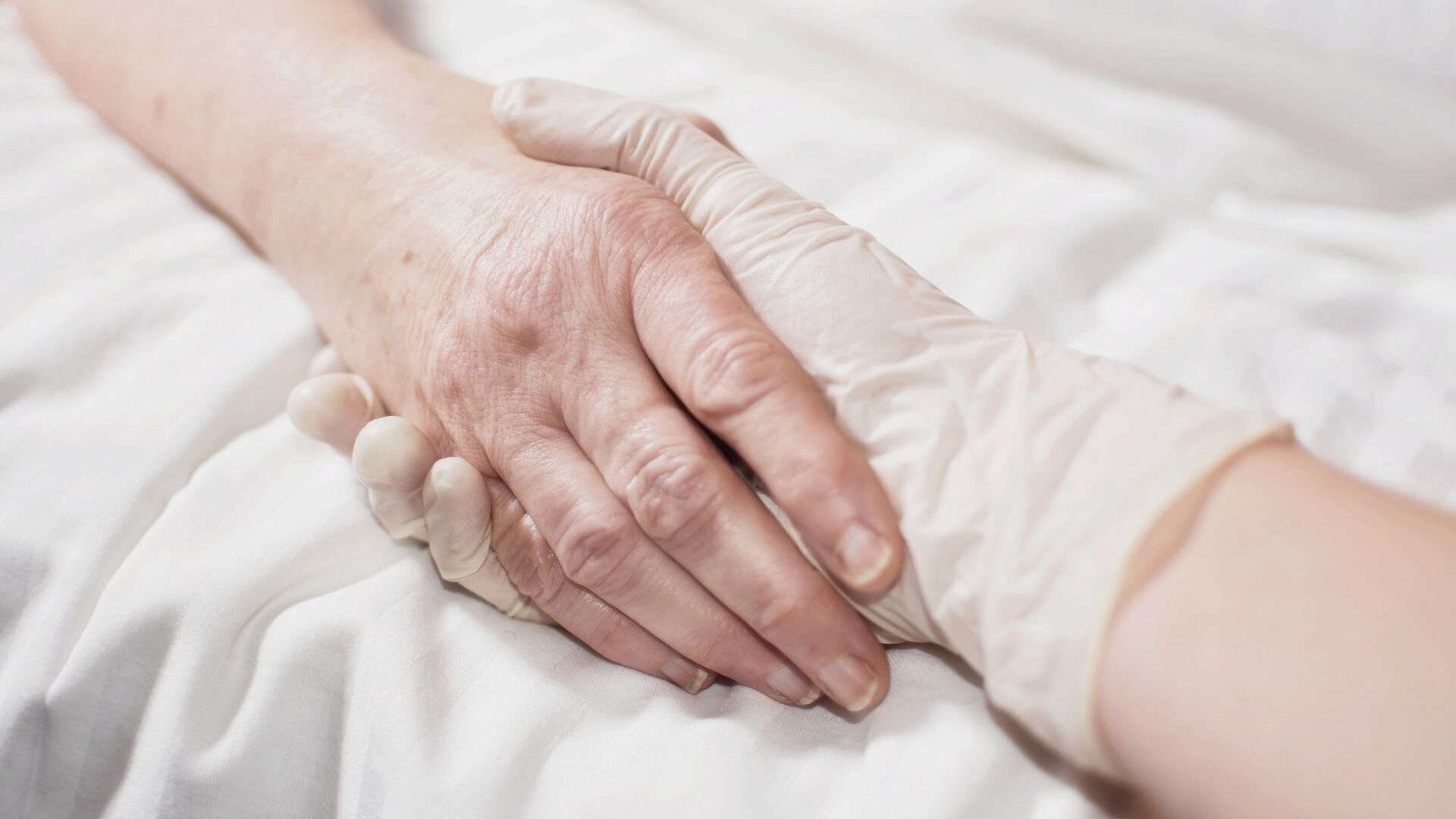https://sputnikglobe.com/20240929/act-of-mercy-or-legalized-murder-who-supports-and-promotes-assisted-dying-and-why-1120345582.html
Act of Mercy or Legalized Murder: Who Supports and Promotes Assisted Dying and Why?
Act of Mercy or Legalized Murder: Who Supports and Promotes Assisted Dying and Why?
Sputnik International
Assisted dying has been heating up over the past twenty years as a growing number of countries have passed legislation legalizing or even providing state support for the practice.
2024-09-29T17:12+0000
2024-09-29T17:12+0000
2024-09-29T17:25+0000
world
george soros
canada
belgium
united kingdom (uk)
world economic forum
euthanasia
pfizer
https://cdn1.img.sputnikglobe.com/img/105807/54/1058075446_0:107:2048:1259_1920x0_80_0_0_74521db533038af1b14d4827834bb8fa.jpg
The origins of the modern right-to-die movement can be traced back to the 1970s, when scholars influenced by the Club of Rome’s liberal humanist agenda and concerns about overpopulation and climate change began presenting assisted dying as a humane way to end suffering, while expanding the individual’s rights over their life and body. More recently, the World Economic Forum has taken up the euthanasia agenda, actively discussing it since at least 2009.Which Countries Allow Euthanasia?In 2002, the Netherlands and Belgium became the first countries in the world to legalize euthanasia and physician-assisted suicide, followed by Luxembourg, Colombia, Canada, Spain, New Zealand, most of Australia’s states, Austria, and most recently, Portugal and Ecuador. Switzerland has allowed passive assisted suicide since the 1940s, although active, doctor-assisted euthanasia is illegal.Assisted dying is not to be confused with passive euthanasia (i.e. refusal of treatment or withdrawal from life support), which is legal in most of Europe, North and South America, and a sprinkling of countries in Asia, Africa and the Middle East. In Russia, Belarus, Belize and Kenya, all forms of euthanasia are prohibited by law.Do Assisted Dying Laws Threaten to Open Pandora’s Box?In many of dozen countries where assisted suicide has been legalized, the original legislation governing the procedures set out strict restrictions. In Belgium, for example, the 2002 Euthanasia Act allowed adults aged 18 or older to undergo assisted suicide if they experienced “constant and unbearable physical or mental suffering that cannot be alleviated.”But in 2013, legislators extended the law to include terminally ill children of any age, pending parental approval and they are deemed to understand the concept of euthanasia. In 2014, authorities approved convicted serial rapist, murderer and right-to-die campaigner Frank Van Den Bleeken’s request to be euthanized, but reversed course in 2016 after the case garnered international attention.In Colombia, the decriminalization of euthanasia for adults of sound mind in 2014 led to the practice being approved for children as young as six – and without parental consent after age 14, in 2018. In 2022, Bogota decriminalized assisted suicide for non-terminally ill people suffering from “severe health conditions” deemed a “threat to dignity.”In Canada, Justin Trudeau’s Liberals spearheaded legislation in 2016 to approve doctor-assisted suicide, but only for mentally competent adults suffering from a terminal illness and close to death. In 2021, the legislation was expanded to include incurable but not terminal illnesses, and in 2023, lawmakers contemplated including people suffering from mental illness. Those plans were shelved in February until 2027, with Health Minister Mark Holland saying it was a “question of readiness” and “training” of medical staff.Assisted Dying as Population Control?Euthanasia legislation has had other dark outcomes. In Switzerland and Belgium, for example, assisted dying has apparently become a lucrative business, with foreigners traveling to the countries in droves. By 2020, Dignitas, a non-profit running Swiss assisted-dying clinics, counted 3,248 assisted suicide cases, most of them foreigners. Belgium, where assisted dying can only be performed by doctors, was dubbed the world’s “euthanasia capital” by Forbes in 2019, and allows qualified applicants to be euthanized for about $3,500.In Canada, lobbying promoting assisted dying has taken an ugly turn, with a 2017 Canadian Medical Association Journal report touting how up to $136.8 million CAD could be saved annually on health care costs through euthanasia. Not bad for a country that has sent over $10.8 billion CAD in weapons and economic aid to Ukraine. The passage of the ‘Medical Assistance in Dying’ (MAiD) program has also resulted in a dramatic surge in assisted suicide deaths, from 1,018 in 2016 to 13,241 in 2022 – accounting for over 4% of all deaths in Canada that year.Canada’s MAiD laws have also led to some extreme cases, like that of Amir Farsoud, a disabled St. Catherines, Ontario man in his 50s struggling from chronic back pain who applied for assisted suicide after losing his rented housing and being put at risk of homelessness. Farsoud was saved after his story went viral, with a GoFundMe page raising over $60,000 for his rent. Alan Nichols, another Canadian, was not so lucky. The 61-year-old, who lost his hearing at age 12 and suffered a stroke in his later years, applied for physician-assisted suicide in 2019, with a nurse practitioner’s assessment citing his hearing and vision loss, seizures, frailty and “failure to thrive” as reasons why he qualified to die. His relatives were not informed of the decision, and he was euthanized by lethal injection. “Alan was basically put to death,” his brother told the Associated Press in 2022.In 2021, a story in New Zealand revealed that COVID-19 patients deemed terminally ill qualified for euthanasia under the 2019 End of Life Choice Act. Local anti-euthanasia campaigners said the story highlighted “the lax nature of the already existing qualifying criteria” for assisted suicide procedures.Proponents of assisted dying rarely open up on the motives for supporting the controversial practice besides ‘compassion’ and ‘bodily autonomy’, but there have been exceptions. In 2009, for example, British psychotherapist and author Colin Feltham penned an eye-opening op-ed in The Guardian where he argued that “there are good reasons for arguing that a stabilization or gradual reduction in population would be the best way to address the carbon emissions problem,” and that assisted dying programs were one possible way to do so.Who’s Funding Pro-Euthanasia Propaganda?Searching for the funders of pro-euthanasia lobbying groups, both in countries where assisted dying has already been adopted, and places where debates are still underway (including the US, the UK and France) is like searching for a needle in a haystack, with donations often coming from private foundations and unknown individual donors. But sometimes riveting details do break through.In 1998, George Soros’ Open Society Foundations published a ‘Project on Death in America’ report, detailing hundreds of thousands of dollars in grants to Dartmouth College, Stanford, Staten Island University Hospital and other academic, medical and cultural institutions for research, education and public policy discussions about death, including physician-assisted suicide, which Soros hoped might “influence the culture of dying” in America. After shelling out $45 million in grants, the project closed in 2003 after being deemed to have “completed all grantmaking.”In March 2024, US lawmakers grilled Pfizer after discovering links between the pharmaceuticals giant and Dying with Dignity Canada, the lobbying group “owning the conversation around assisted deaths” in the country, with media discovering that Pfizer makes three of the lethal drugs recommended by the MAiD program for assisted deaths. Other donors include Google, United Way, and the San Diego chapter of the Hemlock Society – a right-to-die advocacy group that George Soros’ mother Elizabeth was a member of.In the UK, the pro-euthanasia lobby has reportedly received a sympathetic ear from the publicly-funded BBC, and consists of a series of partisan nonprofits funded by little-known groups like the AB Charitable Trust – created in 1990 by former hedge fund manager Yves Bonavero and his wife, which seems to be involved in backing an array of assisted dying lobbying groups, including the Citizens Jury, Humanists UK and the Nuffield Council on Bioethics.
https://sputnikglobe.com/20240728/canadas-trudeau-part-of-globalist-managerial-class-does-not-have-final-say---brother-1119548625.html
https://sputnikglobe.com/20240201/how-eus-ukraine-and-climate-change-adventurism-kill-blocs-farming-1116541935.html
https://sputnikglobe.com/20230611/george-soros-son-alexander-takes-over-family-empire-1111068533.html
canada
belgium
united kingdom (uk)
Sputnik International
feedback@sputniknews.com
+74956456601
MIA „Rossiya Segodnya“
2024
News
en_EN
Sputnik International
feedback@sputniknews.com
+74956456601
MIA „Rossiya Segodnya“
Sputnik International
feedback@sputniknews.com
+74956456601
MIA „Rossiya Segodnya“
which countries allow assisted dying, which countries allow assisted suicide, why is assisted suicide dangerous, is assisted suicide a slippery slope, who supports assisted suicide
which countries allow assisted dying, which countries allow assisted suicide, why is assisted suicide dangerous, is assisted suicide a slippery slope, who supports assisted suicide
The origins of the modern right-to-die movement can be traced back
to the 1970s, when scholars influenced by the Club of Rome’s liberal humanist agenda and
concerns about overpopulation and climate change began presenting assisted dying as a humane way to end suffering, while expanding the individual’s rights over their life and body. More recently, the World Economic Forum has taken up the euthanasia agenda, actively discussing it
since at least 2009.
Which Countries Allow Euthanasia?
In 2002, the Netherlands and Belgium became the first countries in the world to legalize euthanasia and physician-assisted suicide, followed by Luxembourg, Colombia, Canada, Spain, New Zealand, most of Australia’s states, Austria, and most recently, Portugal and Ecuador. Switzerland has allowed passive assisted suicide since the 1940s, although active, doctor-assisted euthanasia is illegal.
Assisted dying is not to be confused with passive euthanasia (i.e. refusal of treatment or withdrawal from life support), which is legal in most of Europe, North and South America, and a sprinkling of countries in Asia, Africa and the Middle East. In Russia, Belarus, Belize and Kenya, all forms of euthanasia are prohibited by law.
Do Assisted Dying Laws Threaten to Open Pandora’s Box?
In many of dozen countries where assisted suicide has been legalized, the original legislation governing the procedures set out strict restrictions. In Belgium, for example, the 2002 Euthanasia Act allowed adults aged 18 or older to undergo assisted suicide if they experienced “constant and unbearable physical or mental suffering that cannot be alleviated.”
But in 2013, legislators extended the law to include terminally ill children of any age, pending parental approval and they are deemed to understand the concept of euthanasia. In 2014, authorities approved convicted serial rapist, murderer and right-to-die campaigner Frank Van Den Bleeken’s request to be euthanized, but reversed course in 2016 after the case garnered international attention.
In Colombia, the decriminalization of euthanasia for adults of sound mind in 2014 led to the practice being approved for children as young as six – and without parental consent after age 14, in 2018. In 2022, Bogota decriminalized assisted suicide for non-terminally ill people suffering from “severe health conditions” deemed a “threat to dignity.”
In Canada, Justin Trudeau’s Liberals spearheaded legislation in 2016 to approve doctor-assisted suicide, but only for mentally competent adults suffering from a terminal illness and close to death. In 2021, the legislation was expanded to include incurable but not terminal illnesses, and in 2023, lawmakers contemplated including people suffering from mental illness. Those plans were shelved in February until 2027, with Health Minister Mark Holland saying it was a “question of readiness” and “training” of medical staff.
Assisted Dying as Population Control?
Euthanasia legislation has had other dark outcomes. In Switzerland and Belgium, for example, assisted dying has apparently become a lucrative business, with foreigners traveling to the countries in droves. By 2020, Dignitas, a non-profit running Swiss assisted-dying clinics,
counted 3,248 assisted suicide cases, most of them foreigners. Belgium, where assisted dying can only be performed by doctors, was
dubbed the world’s “euthanasia capital” by Forbes in 2019, and allows qualified applicants to be euthanized for about $3,500.
In Canada, lobbying promoting assisted dying has taken an ugly turn, with a 2017 Canadian Medical Association Journal report
touting how up to $136.8 million CAD could be saved annually on health care costs through euthanasia. Not bad for a country that has sent over $10.8 billion CAD in weapons and economic aid to Ukraine. The passage of the ‘Medical Assistance in Dying’ (MAiD) program has also resulted in a dramatic surge in assisted suicide deaths, from 1,018 in 2016 to 13,241 in 2022 – accounting for over
4% of all deaths in Canada that year.
Canada’s MAiD laws have also led to some extreme cases, like that of Amir Farsoud, a disabled St. Catherines, Ontario man in his 50s struggling from chronic back pain who applied for assisted suicide after losing his rented housing and being put at risk of homelessness. Farsoud was saved
after his story went viral, with a GoFundMe page raising over $60,000 for his rent.
Alan Nichols, another Canadian, was not so lucky. The 61-year-old, who lost his hearing at age 12 and suffered a stroke in his later years, applied for physician-assisted suicide in 2019, with a nurse practitioner’s assessment citing his hearing and vision loss, seizures, frailty and “failure to thrive” as reasons why he qualified to die. His relatives were not informed of the decision, and he was euthanized by lethal injection. “Alan was basically put to death,” his brother
told the Associated Press in 2022.
In 2021, a story in New Zealand
revealed that COVID-19 patients deemed terminally ill qualified for euthanasia under the 2019 End of Life Choice Act. Local anti-euthanasia campaigners said the story highlighted “the lax nature of the already existing qualifying criteria” for assisted suicide procedures.
Proponents of assisted dying rarely open up on the motives for supporting the controversial practice besides ‘compassion’ and ‘bodily autonomy’, but there have been exceptions. In 2009, for example, British psychotherapist and author Colin Feltham penned an
eye-opening op-ed in The Guardian where he argued that “there are good reasons for arguing that a stabilization or gradual reduction in population would be the best way to address the carbon emissions problem,” and that assisted dying programs were one possible way to do so.

1 February 2024, 19:10 GMT
Who’s Funding Pro-Euthanasia Propaganda?
Searching for the funders of pro-euthanasia lobbying groups, both in countries where assisted dying has already been adopted, and places where debates are still underway (including the US, the UK and France) is like searching for a needle in a haystack, with donations often coming from private foundations and unknown individual donors. But sometimes riveting details do break through.
In 1998, George Soros’ Open Society Foundations published a ‘Project on Death in America’
report, detailing hundreds of thousands of dollars in grants to Dartmouth College, Stanford, Staten Island University Hospital and other academic, medical and cultural institutions for research, education and public policy discussions about death, including physician-assisted suicide, which Soros hoped might “influence the culture of dying” in America. After shelling out $45 million in grants, the project closed in 2003 after being deemed to have
“completed all grantmaking.”In March 2024, US lawmakers grilled Pfizer after discovering links between the pharmaceuticals giant and Dying with Dignity Canada, the lobbying group
“owning the conversation around assisted deaths” in the country, with media discovering that Pfizer makes three of the lethal drugs recommended by the MAiD program for assisted deaths. Other donors
include Google, United Way, and the San Diego chapter of the Hemlock Society – a right-to-die advocacy group that George Soros’ mother Elizabeth was a member of.
In the UK, the pro-euthanasia lobby has
reportedly received a sympathetic ear from the publicly-funded BBC, and consists of a series of partisan nonprofits
funded by little-known groups like the AB Charitable Trust – created in 1990 by former hedge fund manager Yves Bonavero and his wife, which seems to be involved in backing an array of assisted dying lobbying groups, including the Citizens Jury, Humanists UK and the Nuffield Council on Bioethics.





